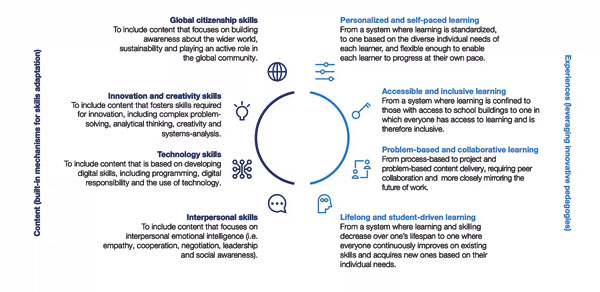The future of learning: How AI is revolutionising education
View(s):Keytakeways :
• Artificial intelligence (AI) can support education by automating administrative tasks, freeing teachers to focus more on teaching and personalised interactions with students, enhancing rather than replacing human-led teaching.
• AI applications in education must be designed collaboratively and with equity in focus, addressing disparities across various demographics and ensuring accessibility for all students.
• Beyond using AI tools for educational purposes, it is crucial to educate students about AI itself, including how to develop AI technologies and understand their potential risks.
In today’s rapidly evolving technological landscape, the intersection of artificial intelligence (AI) and education is not just a future possibility; it is imminent.
Imagine a future where all students receive personalised support and inclusive learning opportunities, build stronger connections with teachers for enhanced guidance and receive apt recognition and evaluation of their achievements.
While the promise of AI in education is compelling, only through responsible and informed adoption can AI truly fulfil its potential and ensure equitable access to quality education for all.
Achieving success with AI in education
1. Supporting teachers’ roles through augmentation and automation
The global teacher shortage poses a formidable challenge to improving educational outcomes, with the demand for educators projected to surge in the coming years. Integrating AI into education can streamline administrative tasks, giving teachers more time for meaningful student engagement.
By automating routine duties and emphasising human-centric teaching, we can create an environment where educators can thrive, creating a richer learning experience. However, teaching involves more than imparting information – AI should augment, not replace teachers’ role.
2. Refining assessment and analytics in education
The integration of AI in education holds promise in revolutionising the assessment and analytics landscape. AI-enabled assessments offer educators invaluable insights, from pinpointing learning trends to supporting the evaluation of non-standardised tests.
By leveraging AI capabilities, educators can expedite the assessment process, offering timely feedback to learners and facilitating more focused engagement. Through real-time analysis, educators can identify strengths and weaknesses in student performance, allowing for targeted instructional strategies.
3. Supporting AI and digital literacy
Many education systems struggle to address the growing digital skills gap, crucial for students’ employability and ethical tech use. Bridging this gap is imperative to cultivate an AI-ready workforce.
AI presents an avenue through which students can improve digital literacy, critical thinking, problem-solving and creativity, preparing learners for future job demands. Integrating AI into education, through traditional or innovative methods, is key to shaping tomorrow’s workforce.

4. Personalising learning content and experience
Extensive research confirms that individual tutoring significantly boosts learning outcomes, with tutored students consistently outperforming 98% of their peers in traditional classroom settings. However, providing personalised tutoring for every student poses a major economic challenge.
AI offers a solution to this hurdle. By harnessing AI, we can now tailor the learning experience to the individual, enhancing academic performance while seamlessly catering to diverse learning needs. Customisable interfaces emerge as invaluable assets, particularly benefiting neurodiverse students and those with diverse physical abilities.
Delivering on AI in education
As we build on the lessons learned, it’s clear that new developments in AI may provide much-needed innovation in education. To make sure that new technologies fulfil their potential to enhance Education 4.0 and lifelong learning, we need to deploy them strategically and safely, taking into account the following factors:
1. Design for equity
Recognising AI’s potential to exacerbate current education gaps, AI-enabled educational innovations must prioritise equity in their design. That means addressing disparities between genders, public and private schools, as well as catering to children with diverse abilities and learning styles, while removing language and access barriers.
2. Enhance human-led pedagogy
AI will never replace high-quality, human-led pedagogy. To that end, most examples focus on enhancing human-led teaching by providing the right AI tools that automate clerical tasks and alleviate teachers’ time to focus on their craft or by providing relevant training about AI skills that help them better deliver lessons on AI.
3. Co-design and implement with supporting stakeholders
AI-enabled innovations in education should acknowledge the critical roles played by teachers, parents and educational institutions in adopting this emerging technology. Successful instances of AI integration in education underscore the importance of collaboratively designed educational solutions with input from students, teachers and experts.
This collaborative, multi-stakeholder approach ensures that solutions meet the practical demands of the classroom, align with national curricula, remain abreast of industry trends and implement safeguards to protect student data.
4. Teaching about AI is equally crucial to teaching with AI
AI tools e.g. those that provide data analytics and gamified learning – have long been part of the educational landscape. While developments in generative AI offer new opportunities to leverage AI tools, it becomes increasingly evident that teaching about AI in schools is vital.
This education should prioritise imparting skills related to AI development and understanding its potential risks. These skills are critical for shaping future talent capable of ethically designing and developing AI tools that benefit economies and societies.
5. Economic viability and access
Ensuring economic viability and access to AI-learning opportunities for all learners, is essential to prevent deepening the existing digital divide and avoid creating new disparities in education. The realisation of AI promise in education requires substantial investment, not only in the products themselves but also in supporting infrastructure, training and data protection.
By addressing these critical aspects, we can unlock the full transformative potential of AI to improve educational outcomes for learners worldwide.
HitAd.lk is the best and biggest mobile phone market in Sri Lanka, and we guarantee you will find what you need here from our extensive listing of mobile phones for sale in Sri Lanka. Whether it’s a budget-priced smartphone for communication, or higher end features with advanced connectivity, there are many different options from which to choose from on our site!


